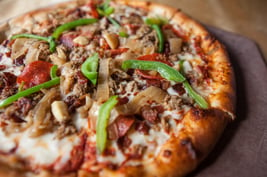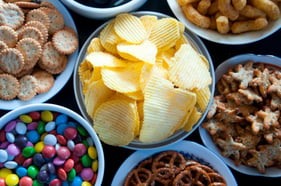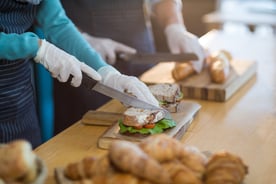
Are Cheat Days OK?
“Are cheat days ok?”
This was the question that I asked myself one morning. I woke up, and hadn’t recalled feeling so bad since I had irresponsibly had too many drinks in my college years. I thought to myself, “is there such a thing as a food hangover?”
Because that is exactly what it felt like.
The day before, I partook in what I had considered one of the most epic cheat meals of all time. One 50-inch pizza, one friend, five toppings, and one hour to eat the entire thing. No leaving your seat. This is a challenge that most people completely overestimate. Especially when it comes to the crust. The crust gets you.  Oh, and at least 2 of your 5 toppings have to be meat. Meat is satiating. Needless to say, we failed the challenge, I had to pay an insane amount of money, and I didn’t eat much for the next two days because I felt that
Oh, and at least 2 of your 5 toppings have to be meat. Meat is satiating. Needless to say, we failed the challenge, I had to pay an insane amount of money, and I didn’t eat much for the next two days because I felt that
another piece of food in my body would kill me.
This was an extreme example of the negative effects of an epic meal, but not too far off the mark for what I thought was a completely normal way of eating. A way of eating that I adapted from the ripped people on social media that knew what they were talking about, and what they were promoting. Or, at least I assumed that was the case.
I assumed wrong.
The protocol goes like this: eat extremely clean and dialed a majority of the time, and then go all in on your cheat meal or cheat day.
This way of eating has made its way into the lives of everyday people, and it’s done so for the worst, in my opinion.
More often than not, cheat meals and cheat days are more harmful than they are helpful.
The big reason I say this is because they can promote a restrict and binge mentality with food. You eat extremely clean throughout the week, because you know that on Saturday, you are going to have whatever your heart desires. You are going to “cheat” on the healthy eating that you have been doing throughout the course of the week. Before it even happens, you are telling yourself that you want to cheat on something that is good for you in order to do something naughty with something you have been told is inherently bad.
And when the cheat meal/day happens, it’s not only whatever you desire. It’s also how much you desire, which is almost always far more than you need. A typical cheat meal doesn’t look like a burger and fries. For most, it’s a burger, fries, a soda, a milkshake, and then some cookies at your favorite bakery on the way home. Oh, and then a whole pizza for dinner along with a pint of ice cream in front of the TV.
As you continue this cycle of eating clean or “restricting” and cheating or “binging”, here is what could be going on in the background:
- - You’re creating a mindset where you feel the need to cheat on something that is good for you. This may cause you to see eating healthy as “bad” or something you have to do as opposed to something you want to do.
- - When you have the cheat meal, you are potentially telling yourself “get as much as you can now because come tomorrow, we’re back to being strict.” This leads to a poor relationship with food that promotes binge eating.
- - This creates a relationship with food where you’re not able to have a piece of cake and enjoy it for what it is, but rather, you feel the need to have two because for some reason you can’t enjoy just the one.
- - This poor relationship with food causes you to look at food as inherently “good” or “bad”, which may not be entirely true.
As you can see, I am not the biggest fan of cheat days. But, there are people out there that claim it helps them be far better with their nutrition, so let’s address this.
 I am rarely one to demonize things in the health, fitness, and nutrition space as inherently good or inherently bad. 99% of the time, the context in which we are speaking will determine if I think it is potentially good or bad. Context matters, and it does for cheat meals, too.
I am rarely one to demonize things in the health, fitness, and nutrition space as inherently good or inherently bad. 99% of the time, the context in which we are speaking will determine if I think it is potentially good or bad. Context matters, and it does for cheat meals, too.
Having said that, if you are someone that feels that cheat days help you stay consistent with your nutritional needs to optimize your health and your results, that is your prerogative. You do you.
However, I would like to challenge that with a question. Is it the structure of cheat days that allows you to be healthy and reach your goals, or is it simply a barrier to keep your poor relationship with food from crashing through?
I bet it’s the latter.
An ideal relationship with food looks like one where we don’t cheat on what’s good for us. We don’t label foods as inherently “good” or “bad”. We don’t restrict and binge. But rather, we find comfort knowing that all food has value, and we select our foods based on what values are highest at that time.
So what does that look like in our lives?
Instead of eating clean and dialed in most of the week and then going crazy and cheating for one day, I suggest a more balanced approach, where you learn to incorporate what you enjoy in moderation, because that’s what emulates life the most.
This is called the 80/20 approach. 80% of your food is whole, natural food. 20% of your food is junkier, more highly processed food, if you want. I prefer 90/10, but 80/20 is a good starting point. The key with this approach is slowing down, adjusting your mindset, and restructuring your relationship with food, so you learn to enjoy eating healthy, and you also learn to enjoy the taste of one cookie without feeling the need to eat the whole tray.
mindset, and restructuring your relationship with food, so you learn to enjoy eating healthy, and you also learn to enjoy the taste of one cookie without feeling the need to eat the whole tray.
I will close with this. This is something that takes time, it’s not easy, and usually requires the help of a professional. So be patient as you navigate this. Slow down, take your time to figure out what your relationship with food truly looks like.
If you’re someone that wants to know the answer to “are cheat days ok?”, just ask yourself, “is this something that improves my relationship with food, or makes it worse?
ABOUT THE AUTHOR
Adam is a fitness professional, baseball fan, and cookie fanatic based in Fort Worth, Texas. After hanging up the cleats, he found a strong interest in the human body and how it performs. Since then, Adam has been transforming lives through fitness in a fun and encouraging atmosphere. As an ACE CPT and Fitness Nutrition Specialist, he is constantly moved to help people improve in all walks of life.
Subscribe Here!
Topics
- Accessible Fitness Machines (1)
- American Diabetes Association (1)
- American Heart Month (2)
- Awareness (3)
- Benefits of Kale (1)
- Best Fitness Websites (1)
- Breast Cancer (1)
- Breast Cancer Awareness (4)
- Buyer Beware (1)
- Cancer (1)
- Cancer Awareness (4)
- Carbohydrates (1)
- Cardio Aid (2)
- Cardio Equipment (7)
- Celebrity Fitness (1)
- Childhood Obesity (2)
- Christmas List (1)
- Commercial Fitness (12)
- Community (1)
- Corporate Wellness (5)
- Cortisol (1)
- Crossfit (2)
- Crosstrainer (1)
- Deals and Discounts (10)
- Diabetes Awareness (1)
- Diamondback Ellipticals (1)
- Diet (1)
- Diet and Nutrition (31)
- Diet Myths (1)
- Dietary Lifestyle Options (1)
- Eating Clean (1)
- EFX (1)
- Elliptical (14)
- Ellipticals (6)
- ElliptiGo (2)
- Energy (1)
- Exercise (6)
- Exercise Accessories (1)
- Exercise and Diabetes (1)
- Exercise at Work (1)
- Exercise Bike (6)
- Exercise Equipment (26)
- Exercise Equipment Demos (11)
- Exercise Machine (5)
- Exercise Prevents Cancer (1)
- Exercising at Night (1)
- Expresso Bike (2)
- Expresso Stationary Bike (2)
- Fat Loss (7)
- Fitness (23)
- Fitness Accessories (2)
- Fitness and Exercise (99)
- Fitness at Work (1)
- Fitness Blogs (6)
- Fitness Books (1)
- Fitness Education (75)
- Fitness for Special Needs (1)
- Fitness Gifts (1)
- Fitness Journey (5)
- Fitness Machine (11)
- Fitness Machines (4)
- Fitness Motivation (13)
- Fitness on the Go (1)
- Fitness Room (2)
- Fitness Stocking Stuffers (1)
- Fitness Technology (1)
- Fitness Tips (2)
- Fitness Tracker (1)
- Fitness Videos (1)
- Fitness Wearables (1)
- Flexibility (2)
- Food Myths (3)
- Fun and Educational Videos (9)
- Functional Training (3)
- Getting Back in Shape (1)
- GFX (1)
- Gift Ideas (1)
- Gluten Free (1)
- Goals (1)
- Gym Safety (1)
- Health (6)
- Health and Fitness (96)
- Health Myths (1)
- Healthy Eating (2)
- Healthy Food (6)
- Healthy Lifestyle (3)
- Healthy Recipes (4)
- Heart Disease (1)
- Heart Health (11)
- HIIT (7)
- HIIT at Home (7)
- Hip Hop (1)
- Holiday Eating (1)
- Holiday Fitness (1)
- Holiday Meals (1)
- Holiday Parties (1)
- Holidays (1)
- Home Fitness (77)
- Home Fitness Equipment (43)
- Home Fitness Machine (2)
- Home Gym (19)
- Home Gym Design (4)
- Hospitality Fitness (1)
- How to Get More Energy (1)
- Hydration (1)
- IFT (1)
- Injury Prevention (1)
- Insider (1)
- Inspiration (1)
- Inspire Ellipticals (1)
- Kale (1)
- Kids Fitness (2)
- Let's Move! (1)
- Low Cholesterol (1)
- Meal Planning (3)
- Men's Fitness (2)
- Metabolism Booster (1)
- Michelle Obama (1)
- Mobility (3)
- Motivation (1)
- Motivation to workout (4)
- Movember (1)
- New Product News (24)
- New Products (1)
- Nu-Step (1)
- Nustep (1)
- Nutrition (2)
- Nutrition Myths (2)
- Office Exercise (1)
- P3 News (7)
- P3 Retail Store News (12)
- Paleo (1)
- Partnership for a Healthier America (1)
- Personal Training (1)
- Postpartum Exercise Routine (1)
- Precor (17)
- Precor Ellipticals (6)
- Precor Treadmills (4)
- Push Pedal Pull (28)
- Recovery (1)
- Recumbent Bike (4)
- Recumbent Cross Trainers (1)
- Resistance Training (2)
- Resolutions (1)
- Rowing Machine (7)
- senior fitness (1)
- silver sneakers (1)
- Site Blog (33)
- Stay Active During Holidays (1)
- Strength Training (11)
- Stress (1)
- Stress Weight (1)
- Stretching (2)
- Strong is the New Skinny (1)
- Successful Resolutions (1)
- Trade in Elliptical (1)
- Trade in Fitness Equipment (1)
- Trade in Treadmill (1)
- Treadmill (13)
- Treadmills (7)
- True Treadmills (1)
- Used Elliptical (1)
- Used Equipment (3)
- Used Exercise Machines (1)
- Used Fitness Equipment (1)
- Used Treadmill (1)
- Valentine Workout (1)
- Valentine's Day (1)
- Vegan (1)
- Vibration Training (5)
- Warming Up (1)
- Weight loss (17)
- Weight Loss Booster (1)
- Weight Training (3)
- Women's Fitness (4)
- Working Out (5)
- Workout Inspiration (2)
- Workout Partner (2)
- Workouts (5)
